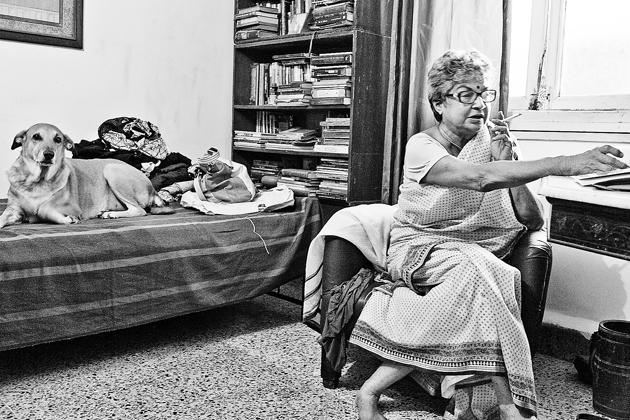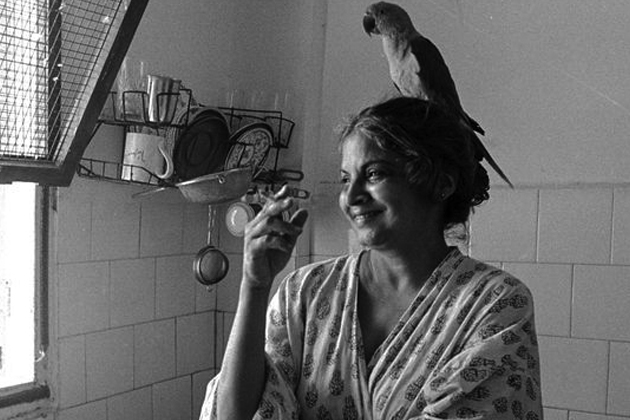Don’t Look For My Life In These Poems
Poems have order, sanity
aesthetic distance from debris.
All I’ve learnt from pain
I always knew,
but could not do.
– Eunice de Souza
I fell in love with the literary world at a very young age. However, as I got older, I realised a pervasive truth – much of the literature I had read and studied bore the imprint of male voices. In the symphony of literary greats, the echoes of female writers were, at best, faint whispers. It was amidst this realisation that I embarked on a personal quest to discover and amplify the voices that weren’t men, to unearth the narratives that held the power to redefine and reshape my literary journey.
In the vast expanse of literature, where male figures dominated my early encounters, the solitary female writer who stood out distinctly was Harper Lee. Yet, I yearned for more. I sought out literary voices that echoed the female experience, that told stories untold and perspectives unseen. It was during this pursuit that I stumbled upon a literary powerhouse, a rebel with a pen – Eunice de Souza. Eunice de Souza, an enigmatic force in Indian poetry, became the beacon of my literary exploration. Her words resonated with a fierce independence, challenging societal norms and carving out a unique niche in the realm of Indian literature.
Eunice de Souza (1940 – 2017) emerged from the cradle of a Goan Catholic family, her formative years woven into the fabric of Pune. Initial forays into education led her to Sophia College in Mumbai, where the seeds of her literary prowess were sown. Subsequently, she ascended intellectual peaks, acquiring a Master’s degree in English literature from Marquette University, Wisconsin, and ultimately earning her PhD from the University of Mumbai.
Kamala Das in Conversation with Eunice de Souza
Excerpt: Conversations with Poets
Embarking on a distinguished career, spanning four decades, de Souza left an indelible mark across literary genres. At St. Xavier’s College in Mumbai, where she commenced her teaching tenure in 1969, she not only imparted knowledge but also held the reins of the Department of English for an extended period. The intellectual breadth of her contributions extended beyond poetry, as evidenced by her authorship of five collections and a pair of novels.
Moreover, she curated anthologies spotlighting Indian women’s voices, steered the editorial helm for volumes of folk tales and children’s poems, and penned insightful review articles on art, literature, and culture for a weekly column in the Mumbai Mirror. Her commitment to the arts manifested in her role as a driving force behind the organisation of stage plays for the annual theatre festival “Ithaka” hosted by St. Xavier’s College.
The crucible of the American civil rights movement in the 1960s potentially etched its influence upon de Souza’s consciousness, fostering a nuanced response to gender disparities entrenched in Indian society. Her poetry, a confluence of the personal and the political, distilled from the crucible of navigating a patriarchal milieu as a Catholic woman, stands as a testament to her keen observation and unwavering critique.
Inaugurating her poetic journey with the collection “Fix” (1979), de Souza asserted her distinct voice – irreverent, unsentimental, and laced with savage irony. The contours of her poetry unfold with a sparse elegance, devoid of superfluous ornamentation or elaborate explication. Rather, she delicately dissects the seemingly mundane lives of the Catholic community that enveloped her, capturing their linguistic idiosyncrasies and attitudes towards the “other” with unerring precision.
Outtakes from Eunice de Souza’s home in Mumbai
Souza’s literary fabric, brushed with satirical nuances, functions as a reflective surface illuminating the normalised underpinnings of societal oppression. Instead of providing explicit moral guidance, Souza invites readers to grapple with these societal fault lines by fostering a collective comprehension of the intricate dynamics she skilfully portrays. While her language may appear bold, it effectively captures the ostensibly minor hurdles that cast shadows over various societal minorities.
In the realm of literature, Eunice de Souza’s prose may exude a sense of bleak existentialism, yet it is laced with a witty intelligence that fearlessly delves into topics and nuances typically relegated to the shadows of societal discourse. In notable works such as ‘Bequest’ and ‘Marriages are made,’ she fearlessly navigates subjects often veiled in cautious romanticism.
It is precisely her unyielding ferocity in self-expression that catapults her into the realm of an empowering literary figure. De Souza’s words, etched with bold candour, have become an indelible part of the literary landscape in India, their resonance deeply embedded in the foundation of literary greatness. Through her unapologetic exploration of the unsaid and unconventional, she transcends the limitations of conventional literary norms. De Souza continues to resonate and challenge the contours of Indian literature and certain rampant societal structures that can be deemed as oppressive, leaving behind an incredible legacy to reference.
Words by Anithya Balachandran.
Image Courtesy Madhu Kaparath and Kamala Das.








